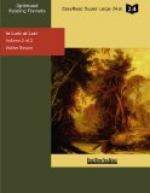Arnold stooped and kissed her hand.
“There is no more perfect lady,” he said, “in all the land.”
“Iris’s father, Mr. Arbuthnot, was a gentleman of honorable and ancient family, and I will tell you, presently, as soon as I find it out myself, his real name. As for his coat-of-arms, he bore Quarterly, first and fourth, two roses and a boar’s head erect; second and third, gules and fesse between—strange, now that I have forgotten what it was between. Everybody calls himself a gentleman nowadays; even Mr. Chalker, who is going to sell me up, I suppose; but everybody, if you please, is not armiger. Iris, your father was armiger. I suppose I am a gentleman on Sundays, when I go to church with Iris, and wear a black coat. But your father, my dear, though he married my daughter, was a gentleman by birth. And one who knows heraldry respects a gentleman by birth.” He laid his hand now on the handle of the safe, as if the time were nearly come for opening it, but not quite. “He sent me, with this last letter, a small parcel for you, my dear, not to be opened until you reached the age of twenty-one. As for the person who had succeeded to his inheritance, she was to be left in peaceable possession for a reason which he gave—quite a romantic story, which I will tell you presently—until you came of age. He was very urgent on this point. If, however, any disaster of sickness or misfortune fell upon me, I was to act in your interests at once, without waiting for time. Children,” the old man added solemnly, “by the blessing of Heaven—I cannot take it as anything less—I have been spared in health and fortune until this day. Now let me depart in peace, for my trust is expired, and my child is safe, her inheritance secured, with a younger and better protector.” He placed the key in the door of the safe. “I do not know, mind,” he said, still hesitating to take the final step; “I do not know the nature of the inheritance; it may be little or maybe great. The letter does not inform me on this point. I do not even know the name of the testator, my son-in-law’s father. Nor do I know the name of my daughter’s husband. I do not even know your true name, Iris, my child. But it is not Aglen.”
“Then, have I been going under a false name all my life?”
“It was the name your father chose to bear for reasons which seemed good and sufficient to him, and these are part of the story which I shall have to tell you. Will you have this story first, or shall we first open the safe and read the contents of the parcel?”
“First,” said Arnold, “let us sit down and look in each other’s faces.”
It was a practical suggestion. But, as it proved, it was an unlucky one, because it deprived them of the story.
“Iris,” he said, while they waited, “this is truly wonderful!”
“Oh, Arnold! What am I to do with an inheritance?”
“That depends on what it is. Perhaps it is a landed estate; in which case we shall not be much better off, and can go on with our work; perhaps there will be houses; perhaps it will be thousands of pounds, and perhaps hundreds. Shall we build a castle in the air to suit our inheritance?”




